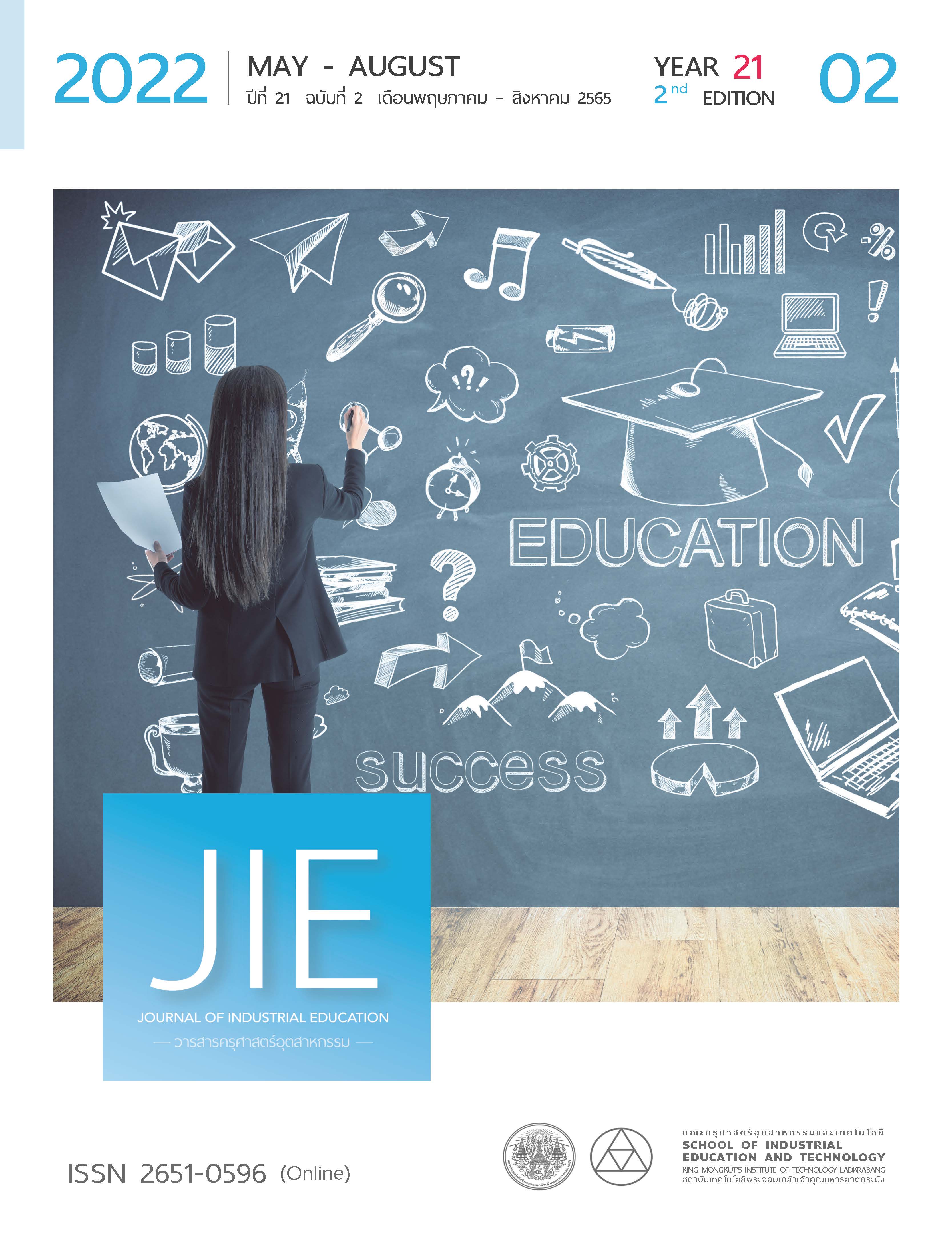THE DEVELOPMENT OF APPLICATION LEARNING ON ANDROID SYSTEM IN THE TOPIC ELECTRICAL MEASUREMENT FOR INDUSTRIAL TEACHING STUDENTS
Keywords:
Application learning on android system, Electrical measurement, Industrial teaching studentsAbstract
Due to COVID-19 pandemic demands more efficient learning models that allow the deployment of technology for students’ active participation in their education. Hence, this study of research was to develop application learning on android system in the topic electrical measurement for industrial teaching students and to compare the learning achievement before and after learning with an application learning on android system in the topic, and that included to study the satisfaction of learners who learned with application learning on android system in the topic electrical measurement. Also, the samples for this research study were 15 students of Bachelor of Science in Technical Educational Program in Electrical Engineering in semester 2/2020 at Faculty of Industrial Education, Rajamaagala University of Technology Suvanabhumi selected by purposive sampling. The instruments of this research were comprised an application learning on android system in the topic the qualitative evaluation form of application learning, an achievement test to find the accomplishment of learning at difficulty index between 0.40-0.80, the discriminate index between 0.40-0.60 and the reliability equal to 0.95 and a satisfaction evaluation form. The used statistics were percentage, mean, standard deviation, and the t-test (Dependent samples). The result of study showed the appropriation of an application learning on android system in the topic electrical measurement for industrial teaching students which assessed the quality from experts at high level. The result of learning achievement from an application learning in the topic electrical measurement for industrial teaching students was concluded that post-test scores were significantly higher than pre-test scores at .05 level and the satisfaction of learners for using of application learning on android system in the topic electrical measurement was high level.
References
Chukwuemeka, E. J., Dominic, S., Kareem, M. A., & Mailafia, I. A. (2021). Redesigning educational delivery systems: The needs and options for continuous learning during the Coronavirus (COVID19) pandemic in Nigeria. Contemporary Educational Technology, 13(1), 1-11.
Falode, O. C., Dine, K., Chukwuemeka, E. J., & Falode, M. E. (2022). Development of an interactive mobile application for learning undergraduate educational technology concepts. International Journal of Professional Development, Learners and Learning, 4(1), 1-7.
Insa-ard, S. (2017). E-Learning Design for Designers and Instructors. SE-Education. (in Thai)
Insa-ard, S. (2018). A design of e-Learning lessons to enhance advance thinking skill. SE-Education. (in Thai)
Kaeworoung, W., Watthankuljaroen, T., Topothai, V., & Sopeerak, S. (2020). Development of an application on android operating system in the topic of basic data communications and computer network for vocational diploma students in Suphan Buri Vocational College. STOU Educational Journal, 13(2), 43-57. (in Thai)
Khattiyamara, W., & Piyapimolasit, C. (2010). Revised bloom’s taxonomy. http://www.watpon.com/Elearning/bloom.pdf. (in Thai)
Kim, S., & Mun, H. J. (2021). Design and development of a self-diagnostic mobile application for learning progress in non-face-to-face practice learning. Applied Science, 11(22), 1-3.
Office of the Education Council. (2017). National education plan (2017 – 2036). Prikwan.
Rahmadani, E. D., & Suryanto, M. A. (2021). Development of android-based learning multimedia for electrical lighting installation courses in vocational high school. Advances in Social Science, Education and Humanities Research, Vol. 591. Proceedings of the 6th Annual International Seminar on Transformative Education and Educational Leadership, Advances in Social Science, Education and
Humanities Research, (pp. 736-739). Atlantis Press.
Seewungkum, D. (2021). Development of Application Supports Learning on Smartphone by Augmented Reality Technology Using KWL Activity for Higher Education Institution in Thailand. Prog. Appl. Sci. & Tech, 11(3), 27-33. (in Thai)
Shamsuddin, S. A., Muhammad, F. M., & Radzi, A. (2019). EML: An android application for electrical education. International Journal of Innovative Technology and Exploring Engineering (IJITEE), 8(12), 5527-5530.
Sriprasertpap, K., & Meerith, S. (2020). Development of learning management with the application to encourage active learning in community: A case study of NTKB application, Thailand. International Journal of Information and Education Technology, 10(5), 341-345.
Sirisukpoca, U., & Krootjohn, S. (2019). Development of mobile application to enhance English pronunciation skill with flipped classroom technique for 3rd grade students. Technical Education Journal: King Mongkut’s University of Technology North Bangkok, 10(2), 227-236.
Suwanno, P. (2020). The development of application learning in educational research on the android operation system for fourth year student Yala Rajabhat. E-Journal of Media Innovation and Creative Education, 3(1), 38-49. (in Thai)
Tamhane K. D., Wasim, T. Khan, S. R., Tribhuwan, A. P., & Sachin B. T. (2015). Mobile learning application. International Journal of Scientific and Research Publications, 5(3), 1-4.
Wongrattana, C. (2017). Techniques in using statistics for research (13th ed.). ThaiNiramitkit Interprogessive. (in Thai)
Downloads
Published
Versions
- 2022-09-20 (2)
- 2022-08-30 (1)
How to Cite
Issue
Section
License
Copyright (c) 2022 Journal of Industrial Education

This work is licensed under a Creative Commons Attribution-NonCommercial-NoDerivatives 4.0 International License.
"The opinions and contents including the words in papers are responsibility by the authors."
"ข้อคิดเห็น เนื้อหา รวมทั้งการใช้ภาษาในบทความถือเป็นความรับผิดชอบของผู้เขียน"



